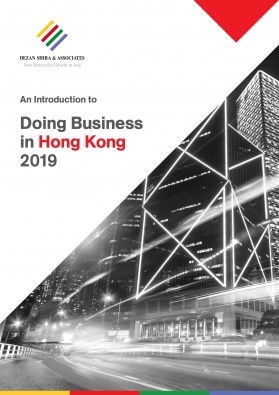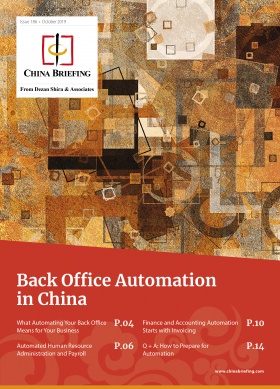Alibaba’s US$11 Billion IPO Proves Why Hong Kong Remains a Money-Making Machine for Foreign Investors Connected with China
Op/Ed by Chris Devonshire-Ellis
Alibaba Group, the Chinese owned online retailer, raised US$11 billion today in its IPO in Hong Kong in a listing that was oversubscribed 40 times. The shares finished six percent higher on the day following their Hong Kong debut this morning.
While it remains true that Hong Kong is part of China, mainland Chinese companies like Alibaba are treated as ‘foreign investors’ as the territory retains a different rule of law and has different listing and financial checking regulations than mainland China – in many cases far stricter. The Alibaba success therefore – the largest IPO in the world in 2019 – is something to be celebrated as it indicates that despite recent social problems, the city financial infrastructure and capital raising capabilities remain very much intact and of benefit to foreign investors. There are many well established reasons for this, which is one issue I have to bear with the increasingly anti-China, China Law Blog, who highlight exactly the opposite in two recent articles this past week. Hong Kong’s Demise and more recently, an article that attempts (but doesn’t) to explain the legal relationship between Hong Kong and China.
I will deal with China Law Blog’s constant putting down of Hong Kong these past few days as follows:
Hong Kong’s Demise suggests that expats are restrained from leaving (untrue), fathers may get caught up in protests and dragged by the hair (untrue), school kids might get gassed in class (untrue), family holidays may be violently disrupted at the airport (untrue), that schools have closed (for one week only, they reopen tomorrow), and that Hong Kong’s famous horse racing has stopped (one meeting was canceled). In fact, a full racing card is on tomorrow night for anyone who wishes to attend. As Shakespeare would say of the writer of the piece, one Fred Rocafort, “The lady doth complain too much.” (I asked about Hong Kong concerning Rocafort, as he claims to have been an American diplomat there. He can’t have been there long or not made much of an impression as no one I spoke to in my 35 years of doing business and living in Hong Kong had ever heard of him). So, in answer to Rocafort’s almighty whine about Hong Kong, let’s get this straight – right now – he doesn’t live there, doesn’t know what he’s talking about, and has embellished the facts concerning Hong Kong to suit China Law Blog’s agenda. It is shameful.
Concerning the legal status between China and Hong Kong, China Law Blog’s Dan Harris – who has never lived in the city and has not established his Harris Bricken practice there – bizarrely attempts to suggest that the links between Hong Kong and China are like those between New York, Frankfurt or Sydney, and China. Huh? Hong Kong has been part of China since mid-1997, and last time I looked none of those cities had tax incentives in place with China and weren’t exactly just next door. (Memo: Buy Dan Harris of China Law Blog a map of the world for Christmas).
Harris then suggests that it may no longer be safe to travel to Hong Kong, while his legal ‘advice’ is actually limited to just this quote concerning arbitration, in which Hong Kong retains a different and separate system to Beijing. Harris asks the question “Will you be able to go there (Hong Kong) in two to three years should you have a dispute? The odds are overwhelming that the answer to that will be yes.”
But then he immediately contradicts himself by saying “But again, why take even this small chance?”
China Law Blog are obviously somewhat confused and conflicted. So, I will help them. Hong Kong retains the “One Country, Two Systems” and will do so until 2047. So no, Hong Kong will not be changing its rule of law or arbitration laws for the next 28 years. China Law Blogs readers can breathe a sigh of relief and be rest assured their Blog doesn’t know what it’s talking about, and that no one is going to be changing anything as concerns the rule of business law in Hong Kong for some time to come.
Indeed, Hong Kong remains an excellent place to do business, and especially for foreign investors. Why?
Because as I wrote in the article “Hong Kong Holding Up as a Vibrant Business Hub,” Hong Kong has numerous and original advantages as concerns trade, legal, and tax links as follows:
- The Hong Kong dollar is an internationally traded currency and is linked to the US dollar. It is easy and simple to transfer Hong Kong dollars anywhere in the world and for it to be converted to local currencies elsewhere, with the protection of the US dollar peg preventing it from experiencing fluctuations. It remains a globally “safe” currency to use.
- Hong Kong does not impose any additional taxes on profits realized externally from its territory. This means dividends, for example, paid from the profits of a China-based company can be sent to Hong Kong without incurring any further taxes, and be distributed from there.
- Hong Kong companies are subject to Hong Kong’s Rule of Law, which remains based on the British, not Chinese legal system.
- Hong Kong enjoys preferential trade with China under the “Closer Economic Partnership” system or CEPA, which provides early bird market entry and other advantages to qualifying Hong Kong companies in new and emerging trade areas. This capability is not available to companies from other regions or countries.
- Hong Kong company documentation is in tri-lingual format – English, Simplex (Hong Kong) characters, and Mandarin characters. This saves a lot of time and money on having translations done.
- Hong Kong is a free port and imposes zero or low import taxes on thousands of products, which can land in Hong Kong duty free.
- It has extensive connectivity via road, rail, shipping, and air to all major Chinese cities and throughout Asia.
- It is the center of the “Greater Bay Area,” which includes all cities of the Pearl River Delta and collectively represents 26 percent of all mainland China trade. Hong Kong is right in the heart of this.
- Taxes remain low, with individual income tax at a high rate of 15 percent and corporate income tax at 16.5 percent.
- Hong Kong is currently ranked fourth in the World Bank Global Ease of Doing Business rankings, and its ranking score has in fact increased slightly over the past year.
- US banks, such as Citibank are fully licensed in Hong Kong, while other US banks, such as Bank of America, Bank of New York Mellon, Cathay Bank, East West Bank, JP Morgan Chase, HSBC US, State Street & Trust Bank, and Wells Fargo all have Hong Kong licenses. US banks with restricted banking licenses operating in Hong Kong include Bank of America Securities, Fiduciary Trust and Silicon Valley Bank. What does this mean? That American money and assets held in Hong Kong are safe.
The bottom line here is that Hong Kong retains all of the advantages it always has had when doing business in China or in the Asian region generally. Blogs such as China Law Blog seek to denigrate the territory because they have vested interests in doing so. I’m not privy to what these are but I imagine it is because they are attempting to persuade their US readers potentially interested in Hong Kong to either use American offshore entities based in Delaware or Nevada instead, or are trying to make money from persuading them to re-shore back to the US or Mexico. Indeed, in a few rare cases there may be good reasons for doing just that. But to completely write Hong Kong off as a legal entity from which to conduct business with China – well I’m afraid neither Delaware, Nevada, or Mexico, Spain or Thailand – all of which China Law Blog have recently been promoting – were ever designed to do business with China. Just one jurisdiction holds all the business, legal, and tax trump cards when to comes to investing in China, and its name remains: Hong Kong.
About Us
China Briefing is produced by Dezan Shira & Associates. The firm assists foreign investors throughout Asia from offices across the world, including in Dalian, Beijing, Shanghai, Guangzhou, Shenzhen, and Hong Kong. Readers may write to china@dezshira.com for more support on doing business in China.
- Previous Article Incentive Schemes in ASEAN, e-Commerce in Vietnam – China Outbound
- Next Article Экономическая Реформа в Китае: Нынешний Прогресс и Будущие Перспективы






